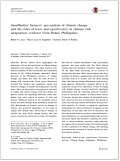| Journal Article |
 |
|
| Article Title | Smallholder farmers’ perceptions of climate change and the roles of trees and agroforestry in climate risk adaptation: evidence from Bohol, Philippines | | Author | Rodel D. Lasco, Marya Laya O. Espaldon and Christine Marie D. Habito | | Year | 2015 | | Journal Title | Agroforestry Systems | | Institution | Springer | | Volume | 90 | | Pages | 521-540 | | Call Number | JA0643-15 | | Keywords | Roles of trees, Agroforestry, Ecosystem services, Climate change, Adaptation, Philippines |
|
| Abstract: |
| Recent studies have highlighted theimportance of trees and agroforestry in climate changeadaptation and mitigation. This paper analyzes howfarmers, members of their households, and communityleaders in the Wahig–Inabanga watershed, Boholprovince in the Philippines perceive of climatechange, and define and value the roles of trees incoping with climate risks. Focus group discussionsrevealed that farmers and community leaders hadobserved changes in rainfall and temperature over theyears. They also had positive perceptions of tree rolesin coping with climate change, with most timber treespecies valued for regulating functions, while nontimbertrees were valued as sources of food andincome. Statistical analysis of the household surveyresults was done through linear probability models forboth determinants of farmers’ perceived changes inclimate, and perceived importance of tree roles incoping with climate risks. Perceiving of changes inrainfall was more likely among farmers who hadaccess to electricity, had access to water for irrigation,and derived climate information from governmentagencies and mass media, and less likely amongfarmers who were members of farmers’ organizations.On the other hand, perceiving of an increase intemperature was more likely among famers who weremembers of women’s organizations and had more off/non-farm sources of income, and less likely amongthose who derived climate information from governmentagencies. Meanwhile, marginal effects of theregression on perceived importance of trees in copingwith climate change revealed positively significantrelationships with the following predictor variables:access to electricity, number of off/non-farm sourcesof income, having trees planted by household members,observed increase in temperature and decline inyield, and sourcing climate information from governmentagencies. In contrast, a negatively significantrelationship was observed between recognition of theimportance of tree roles, and level of education, andderiving income from tree products. In promoting treebasedadaptation, we recommend improving access tonecessary inputs and resources, exploring the potentialsof farmer-to-farmer extension, using participatoryapproaches to generate farmer-led solutions basedon their experiences of climate change, and initiatinggovernment-led extension to farmers backed by nongovernmentpartners |
|